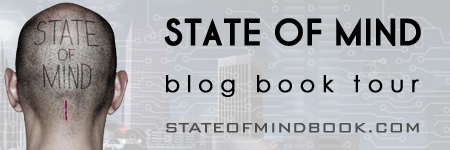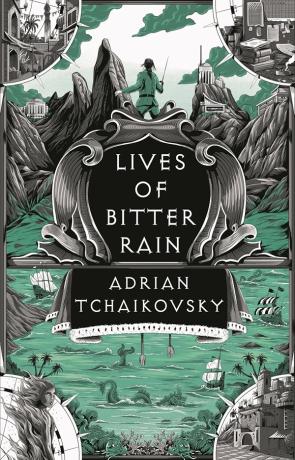Sven Michael Davison on Ebook Piracy
Yesterday I interviewed Sven Michael Davison about his new Dystopian vision "State of Mind" and during the interview I realised that he was in an almost unique position of being involved in the anti-piracy battle working for Fox and then seeing Piracy from the angel of a content creator after writing State of Mind, so I asked him another question, he was kind enough to provide a very insightful and detailed answer:
Ant: Piracy is a very emotive subject and something that I have written about on a number of occasions - as the emerging ebook market is experiencing the same issues as the film and music industry.
How do you see the book industry overcoming this threat and as a creator of media has this changed your perceptions of piracy?
Sven: I'm not sure the book industry can overcome piracy. I worked with the engineers at Fox on the implementation of BD+ (Blu-ray DRM). We were all excited that every frame would be encrypted so even if a hacker could crack into the file, they'd have their work cut out for them getting the entire film. As soon as Fox and Cryptography (which became ROVI and now Sonic Solutions) announced the measure, there were hackers announcing they would beat it. There's been a slam dance of new encryptions and hacks ever since. I believe this will always be the case, no matter what counter-measures the creative industry comes up with.
The studios tried to embark on a campaign to educate the public that ripping films and music was stealing. I don't know if you remember those trailers in theaters back in 2006 and 2007, but I recall audiences laughing at them. Nobody wants to hear a Fortune 100 Company whining about profit loss. Hackers consider themselves modern day Robin Hoods. They are robbing from the rich and giving to the poor. I interviewed a hacker and modeled my character Leah Nolan after him. I used other hacker stories to create the other God Heads as well.
Speaking strictly as an artist I can say piracy sucks. As I stated in my interview with you, I spent 3,000 hours (spread over ten years) writing State of Mind. Like all other writers I have met, we would love to pay our bills and send our kids through higher education based on the profits we make on writing. I'm not talking about owning some mansion, driving a Ferrari and sending my kid to the top private institutions, I'm talking about making a living-- paying the bills so I can spend my days doing what I love. However, the prevailing attitude I hear from most folks is that entertainment should be free. I'm even reading blog debates that say the most anyone should charge for an ebook is $0.99. This would mean that writing would be limited to best selling authors, the independently wealthy, and those who have day jobs that are light on stress (and time constraints) and can crank out a book in a couple of months during their spare time.
I used to love to build sandcastles as a kid. I'd spend hours digging large moats, thick walls around my village, and tall spires for the castle. Inevitably I would go out to bodysurf and find that some kid had taken a few seconds to destroy everything I had built. Piracy is the same. A movie equates to thousands of people all contributing their years of experience towards a common goal. Yes, they get paid, some absurdly so, but what does the pirate contribute? If no one is compensated for creative work, why do it? What's the incentive? Yes, I love to write, but I also want a family, a home, the ability to travel, and now that I'm getting older, the ability to pay my family's medical bills. I spent my 20s turning down every promotion because I wanted to have four hours each night to write. I was always living check to check and a few steps above the poverty level. That's romantic when you're young, painful when you're older and can't afford to pay a dentist to fix a toothache. I grew tired of starving so I spent my 30s working 70 to 80 hours a week with barely the time to take a leak during the day. I averaged fifteen minutes for lunch and put my time in during every weekend and holiday. I rose from temp to Vice President in five years, but I had to fight for each promotion and raise. I'm willing to dedicate even more time to my writing career, but if someone is simply going to steal all my hard work, I can't keep it up. No person can exist without spiritual and financial reward.
Getting back to the proponents who believe the cap for ebooks should be $0.99, these writers might achieve their dream someday as Amanda Hocking did, but here's the rub: For every Amanda Hocking there are a hundred thousand writers who are barely getting by. With margins so low, $0.99 means there's no incentive for most writers, which means we'll lose a great deal of creative talent down the road. And who's to say $0.99 won't sound like highway robbery in a couple of years? At some point we'll be looking at free again. Then all we'll be left with are knock-knock jokes and adlibs.
Amanda's success is attributed to her brilliant social networking and the fact that she can finish a product extremely fast. Now that she has a seven-figure deal with St. Martins Press, she's going to have the pressure of a large corporation expecting the same performance and then some. But luckily she'll have a large marketing machine backing her so it will take the pressure off to constantly tweet and blog. But that machine costs money, which means her sales price will have to go up to pay for the overhead. Some of her fans will be pissed and will probably pirate her books. That's not fair to Amanda, who works her ass off, or to St. Martin's Press, who has finally given her a just reward.
There might be a few writers who possess Amanda's combination of talents, but for those of us who must march to the beat of a different drummer, the ebook renaissance will have died a quick death and we'll be back to trying to find another solution to break into the publishing fortress.
Bottom line: Nothing is free. SOMEONE ALWAYS PAYS. I dare you to find an exception.
News Archives
- August 2024
- July 2023
- April 2023
- February 2023
- September 2022
- March 2022
- February 2022
- July 2021
- June 2021
- April 2021
- March 2021
- January 2021
- October 2020
- September 2020
- June 2020
- March 2020
- May 2019
- January 2019
- November 2018
- January 2016
- September 2015
- August 2015
- July 2015
- June 2015
- May 2015
- April 2015
- March 2015
- January 2015
- October 2014
- June 2014
- April 2014
- March 2014
- February 2014
- January 2014
- December 2013
- November 2013
- October 2013
- September 2013
- June 2013
- May 2013
- April 2013
- March 2013
- January 2013
- December 2012
- November 2012
- August 2012
- July 2012
- June 2012
- May 2012
- April 2012
- March 2012
- February 2012
- January 2012
- December 2011
- November 2011
- October 2011
- September 2011
- August 2011
- July 2011
- June 2011
- May 2011
- April 2011
- March 2011
- February 2011
- January 2011
- December 2010
- November 2010
- October 2010
- September 2010
- August 2010
- July 2010
- June 2010
- May 2010
- April 2010
- March 2010
- February 2010
- January 2010
- December 2009
- November 2009
- October 2009
- September 2009
- August 2009
- July 2009
- June 2009
- May 2009
- April 2009
- March 2009
- February 2009
- January 2009
- December 2008
- November 2008
- October 2008
- September 2008

